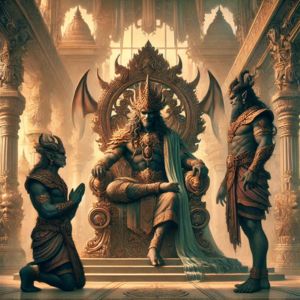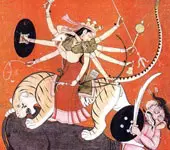Captivated by Devi: Shumbha’s Path to Defeat

Meaning of the 43rd shloka of the 5th chapter of Durga Saptashati.
ताभ्यां शुम्भाय चाख्याता सातीव सुमनोहरा। काप्यास्ते स्त्री महाराज भासयन्ती हिमाचलम् ॥
In Devi’s incarnation to destroy Shumbha and Nishumbha, physical beauty has a lot of importance. In Brahma’s boon to Shumbha and Nishumbha, the condition was that they they should feel attracted towards a woman, then only she can kill them.
Here, after seeing Devi in the Himalayas, Chanda and Munda, assistants of Shumbha and Nishumbha are reporting this to Shumbha.
‘O King, there is a unique and attractive woman is radiantly illuminating the Himalayas. She is exceedingly beautiful and captivating.’
The word "सुमनोहरा" suggests that she is attractive in a way that captivates the minds and hearts of everyone.
She can captivate even the purest minds.
The suggestion is that her beauty is capable of captivating Shumbha’s mind and compelling him to desire her.
The 44th shloka -
नैव तादृक् क्वचिद्रूपं दृष्टं केनचिदुत्तमम् । ज्ञायतां काप्यसौ देवी गृह्यतां चासुरेश्वर ॥
Such supreme beauty has never been seen by anyone before. O Lord of the Asuras, and take her as your own.
The 45th shloka -
स्त्रीरत्नमतिचार्वङ्गी द्योतयन्ती दिशस्त्विषा । सा तु तिष्ठति दैत्येन्द्र तां भवान्द्रष्टुमर्हति ॥
She is a jewel among women, exceptionally beautiful, illuminating all directions with her radiance. O Lord of the Daityas, she stands there, and you should see her.
The 46th shloka -
यानि रत्नानि मणयो गजाश्वादीनि वै प्रभो । त्रैलोक्ये तु समस्तानि सांप्रतं भान्ति ते गृहे ॥
O Lord, all the jewels, gems, elephants, horses, and other treasures of the three worlds are now shining in your palace.
The 47th shloka -
ऐरावतः समानीतो गजरत्नं पुरंदरात् । पारिजाततरुश्चायं तथैवोच्चैःश्रवा हयः ।।
Airaavata, the gem among elephants, has been snatched away by you from Indra. Here is also the Parijata tree and likewise the horse Ucchaihshrava.
The 48th shloka -
विमानं हंससंयुक्तमेतत्तिष्ठति तेऽङ्गणे । रत्नभूतमिहानीतं यदासीद्वेधसोऽद्भुतम् ।।
A celestial chariot, adorned with swans, stands in your courtyard. This marvelous creation, once the wonder of Brahma, has been brought here as a precious treasure.
The 49th shloka -
निधिरेष महापद्मः समानीतो धनेश्वरात् । किंजल्किनीं ददौ चाब्धिर्मालामम्लानपङ्कजाम् ॥
This great treasure, Mahapadma, has been brought from Kubera, the Lord of Wealth. The ocean has also gifted a garland of ever-fresh lotus flowers with golden pollen.
The 50th shloka -
छत्रं ते वारुणं गेहे काञ्चनस्त्रावि तिष्ठति । तथायं स्यन्दनवरो यः पुरासीत्प्रजापतेः ॥
The golden umbrella of Varuna stands in your palace. Likewise, here is the splendid chariot that once belonged to Prajapati.
The 51st shloka -
मृत्योरुत्क्रान्तिदानाम शक्तिरीश वया हृता । पाशः सलिलराजस्य भ्रातुस्तव परिग्रहे ||
The power to take lives has been taken from Yama by you, O Lord. The noose of the Lord of Waters (Varuna), is in possession of your brother.
The 52nd shloka -
निशुम्भस्याब्धिजाताश्च समस्ता रत्नजातयः । वह्निचापि ददौ तुभ्यमेग्निशौचे च वाससी ॥
All types of jewels born from the ocean belong to Nishumbha. Agni (the fire god) has also given you a pair of garments called ‘Agnishaucha’.
The 53rd shloka -
एवं दैत्येन्द्र रत्नानि समस्तान्याहृतानि ते । स्त्रीरत्नमेषा कल्याणी त्वया कस्मान्न गृह्यते ।।
Thus, O Lord of the Daityas, all treasures have been brought to you. Why then do you not take this auspicious jewel among women?
The 54th shloka -
ऋषिरुवाच । निशम्येति वचः शुम्भः स तदा चण्डमुण्डयोः । प्रेषयामास सुग्रीवं दूतं देव्या महामुरम्॥
The sage said: Hearing these words from Chanda and Munda, Shumbha then sent Sugriva, his powerful messenger, to the goddess.
These verses showcase Shumbha’s incredible wealth and power, with his palace filled with rare treasures from the gods, like Indra’s elephant Airavata, Varuna’s golden umbrella, and Kubera’s precious gems. Despite possessing everything, Shumbha becomes deeply attracted to the Devi when his advisors, Chanda and Munda, describe her as the most beautiful and radiant woman they have ever seen. According to Brahma’s boon, Shumbha and Nishumbha can only be defeated by a woman they desire. Captivated by her beauty, Shumbha sends his messenger, Sugriva, to approach the Devi and try to win her over. This act sets the stage for the final confrontation, where Shumbha’s pride and desire ultimately lead him to his downfall.

English
Devi Mahatmyam
Click on any topic to open
7
30
Astrology
Atharva Sheersha
Bhagavad Gita
Bhagavatam
Bharat Matha
Devi
Devi Mahatmyam
Ganapathy
Glory of Venkatesha
Hanuman
Kathopanishad
Mahabharatam
Mantra Shastra
Mystique
Practical Wisdom
Purana Stories
Radhe Radhe
Ramayana
Rare Topics
Rituals
Rudram Explained
Sages and Saints
Shiva
Spiritual books
Sri Suktam
Story of Sri Yantra
Temples
Vedas
Vishnu Sahasranama
Yoga Vasishta